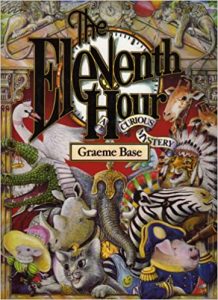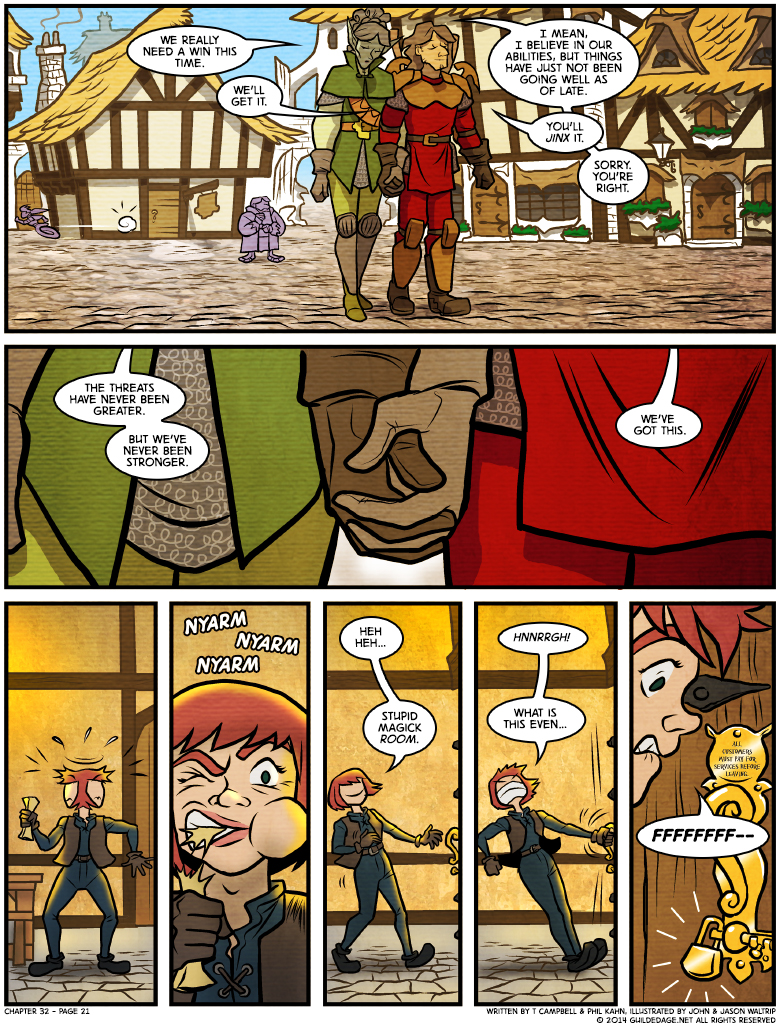Annotated 32-21
 Pitch #8 of 10: The Curious Adventures of Professor Wyn.
Pitch #8 of 10: The Curious Adventures of Professor Wyn.
One of the oldest mystery subgenres is the “fair play” mystery, in which the reader could reasonably be expected to figure out whodunit themselves, based on the evidence that the rest of the clues laid down. In the other major variety, the “clueless” mystery, the reader has no such hope. But every so often I’ve run across a third sort, the cryptic mystery, in which there are clues to the answer, just in places you wouldn’t expect. (Graeme Base’s The Eleventh Hour, at right, is a strong example of the genre that delighted my brother and me in the days when I was reading him stories.)
Think panel borders, codes hidden in dialogue, negative space, color cues. While the highly tenured mathematician Professor Wyn solves a series of challenging crimes by hunting for clues in the evidence, you the reader get a chance to figure them out by hunting for clues in the format.
The general theme I envision for these mysteries is “privileged people behaving badly,” the better for Wyn to deflate their egos. His long-held position in an Ivyish institution means that he occasionally mingles well outside his tax bracket, thanks to the handful of his old students who found his irreverence a refreshing delight. In fact, the more it outrages their self-important peers, the more likely they are to extend him invitations, and Wyn lives by one guiding principle: “There is no such thing as a free lunch that I’ll refuse the chance to eat.”
Of course, pissing off the rich and powerful carries its own dangers, and Wyn’s old military training has to save his bacon now and again, sometimes even from people who aren’t guilty of the crimes he investigates. But the upper crust’s talent for sweeping things under the rug means that it’s rare their misdeeds will command the focused attention of a CSI team. Aside from the occasional intern shadowing him, Wyn has to do his detecting pretty much on his own… and that’s generally the way he likes it.











Frigg’s penniless body was found days later….
Syr’nj: “We really need a win this time.” Byron: “We’ll get it.” Narrator: “They will not.”
The pitch sounds like good fun. I love beautifully illustrated puzzle books, even if I’m no good at them. I have some treasured books by e.g. Christopher Manson and Mike Wilks, bought in the 80s and 90s, that I still haven’t completely solved and refuse to look up the answers to.
The pitch sounds fun but probably a headache to design. Definitely something to go into with a solid buffer and probably gaps between stories to build the next and just avoid a commitment to daily updates or something should things get difficult later.
I think I’m attuned to downsides though because it looks like a long-running comic I’ve been following just either fully burned out or is having a creator crisis. I don’t want anyone else stumbling like Skin Horse.
Well, hearing about that stings a bit: Shaenon and I were tight for a long while and even worked together a bit. I have to admit I haven’t been keeping up with Skin Horse, but there’s a lot of strips that have fallen off my radar. Things must be rough if she’s cutting it off mid-storyline.
I’ve always been in favor of the planned ending, and the mystery genre really demands it: you can’t start a whodunit and say to yourself, “Here are four suspects, I’ll figure out who did it later.” Well, I guess you could, but keeping possibilities open there seems like creating more work for yourself than knowing what’s a clue and what’s a red herring right off. A series of cozy mysteries is a little more open-ended than an epic about changing society, but that just means you have a set of potential jumping-off points instead of one big one.
FWIW, it looks like Skin Horse will be returning in a month or so.
If you’re writing a Mystery Novel, I could see it working just fine to go “these are my suspects, these are their motives, I’ll figure out who actually did murders later” because, once you’ve done that, you can go back and edit everything to tighten it all up, add any necessary clues, and so on. Whether it’s actually “more work” to do it that way or to pre-plan, I think depends on how your own personal writing process works. I think some people find it easier to just …go and write and then fix it in post, while others really need a map or something. And either way works when you can go back and revise everything.
In a fully serial format, where you don’t have that luxury (Howard Taylor “LUXURY!”) I will definitely concur with T though. When you work without a net, you need to plan it all in advance, especially for a Mystery.
Aw man, The Eleventh Hour. That book was my absolute jam. My parents kept it in the car because they knew it could keep me shut up for hours on end. Graeme Base’s illustrations are really something else. I never did find all the mice.
The Eleventh Hour was amazing. I still have my copy.
And I like the idea of the above pitch too, but I’ll agree that it’s probably not easy to put something like that together, so a buffer would be a really good idea.